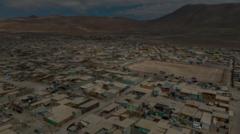Recent research led by Dr. Virginia Carter Gamberini from Universidad Mayor has suggested that fog harvesting could be key in addressing water shortages in Alto Hospicio, Chile, a city situated in one of the driest regions on the planet, with an average annual rainfall of less than 0.19 inches (5mm). Many residents, especially in impoverished slum areas, lack proper access to water supply networks and depend on trucked-in water, which highlights the urgent need for a sustainable solution.
Fog harvesting involves using a fine mesh material suspended between poles to capture moisture from fog-laden clouds. As these clouds flow through the mesh, droplets form and are directed into pipes and storage tanks. Although this method has been in use at smaller scales for years, mainly in rural areas of South and Central America, Dr. Carter believes larger-scale fog harvesting systems could significantly improve urban water supplies where it is most critical.
In their comprehensive study, which combines fog water production assessments with satellite cloud formation data and weather forecasts, the researchers concluded that the regular fog over Alto Hospicio could deliver a viable source of drinking water to its communities. Their findings were published in the journal Frontiers of Environmental Science.
The conditions that create fog over the Pacific Coast—where warm, moist air meets cold water—are ideal for capturing water. With a calculated collection rate of 2.5 liters per square meter of mesh per day, they estimated that deploying 17,000 square meters of mesh could meet the weekly water need of 300,000 liters currently delivered via trucks. Additionally, just 110 square meters could sufficiently irrigate the city’s green spaces, while the fog water could also support hydroponic agriculture.
Given the increasing urban growth, demand on dwindling underground aquifers, and pressures from industries like mining, the scientists emphasize the growing necessity for alternative sustainable water sources. Dr. Gamberini noted the unique geographical advantages of Chile, where extensive coastlines and mountains create abundant fog conditions.
Her research team is actively developing a comprehensive "fog harvesting map" of the country. "Water from the clouds," Dr. Carter suggests, represents a promising strategy to not only enhance urban resilience to climate change but also improve overall access to clean water for vulnerable populations.




















